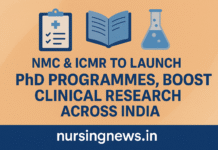Nursing is a noble profession that plays a crucial role in healthcare delivery. In India, there are various nursing courses available to aspiring individuals who are passionate about providing care to patients. These courses cater to different levels of education and specialization, ensuring that students receive comprehensive training in the field of nursing. In this article, we will explore the various nursing courses offered in India, their durations, accreditation bodies, additional qualifications they provide, and the eligibility criteria for admission.
Auxiliary Nurse & Midwife (ANM):
Duration: 2 years
Accreditation: Nursing Examination Board
Qualification: R.ANM
Eligibility: To be eligible for admission to the ANM course, candidates must have completed 10+2 or its equivalent from a recognized board. The minimum aggregate marks required may vary from one institution to another. Some institutions may also have additional eligibility criteria, such as a minimum age limit.
The Auxiliary Nurse & Midwife (ANM) course is a two-year program that trains individuals to provide basic nursing care to patients. ANMs primarily work in rural and community healthcare settings and play a vital role in maternal and child healthcare.
General Nursing & Midwifery (GNM):
Duration: 3 and 1/2 years (3 years from 2015-2016 onwards)
Accreditation: Nursing Examination Board
Qualification: R.N & R.M
Eligibility: The eligibility criteria for GNM courses include completion of 10+2 or its equivalent with Science subjects (Physics, Chemistry, and Biology) from a recognized board. Candidates must also meet the minimum aggregate marks requirement set by the respective institution. Some institutions may conduct entrance exams or interviews as part of the selection process.
The General Nursing & Midwifery (GNM) course is a comprehensive program that focuses on general nursing and midwifery practices. It prepares students to provide primary healthcare services, including nursing care, midwifery, and community healthcare. GNM is one of the most sought-after nursing courses in India.
B.Sc (Basic) Nursing:
Duration: 4 years
Accreditation: University
Qualification: R.N & R.M
Eligibility: Candidates seeking admission to B.Sc Nursing programs must have completed 10+2 or its equivalent with Science subjects (Physics, Chemistry, and Biology) from a recognized board. The minimum aggregate marks requirement and age limit may vary across institutions. Additionally, some universities may conduct entrance exams or consider the scores of national-level nursing entrance exams.
Bachelor of Science (B.Sc) in Nursing is a four-year undergraduate program offered by universities. It provides a strong foundation in nursing theory, clinical skills, and research. B.Sc Nursing graduates are eligible for various nursing positions in hospitals, clinics, and research institutions.
B.Sc (Post Basic) Nursing:
Duration: Regular: 2 years, Distance: 3 years
Accreditation: University
Qualification: Additional Qualification
Eligibility: To be eligible for admission to B.Sc (Post Basic) Nursing, candidates must have completed GNM (General Nursing & Midwifery) and should be a registered nurse. Some universities may also require work experience as a registered nurse for a specified period.
B.Sc (Post Basic) Nursing is a program designed for registered nurses who have completed their General Nursing & Midwifery (GNM) course. It offers advanced knowledge and specialization in nursing practice, enabling nurses to enhance their clinical expertise and leadership skills.
M.Sc Nursing:
Duration: 2 years
Accreditation: University
Qualification: Additional Qualification
Eligibility: For admission to M.Sc Nursing programs, candidates must have a Bachelor’s degree in Nursing (B.Sc Nursing) from a recognized university or institution. Some universities may require a minimum aggregate marks score in the undergraduate program. Additionally, candidates should have a valid nursing registration certificate and relevant work experience as a registered nurse. Entrance exams, interviews, and counseling sessions may also be part of the selection process for M.Sc Nursing programs.
Master of Science (M.Sc) in Nursing is a postgraduate program that provides in-depth knowledge and specialization in various nursing fields. It equips nurses with advanced research, administrative, and clinical skills, opening up opportunities for leadership roles in healthcare organizations.
M.Phil Nursing:
Duration: 1 year (Full-time), 2 years (Part-time)
Accreditation: University
Qualification: Additional Qualification
Eligibility: To be eligible for M.Phil Nursing programs, candidates should have completed their M.Sc Nursing degree with a minimum aggregate marks requirement set by the respective university. Some universities may also require candidates to have a minimum work experience as a registered nurse.
M.Phil in Nursing is a research-oriented program that focuses on developing research skills and expertise in nursing. It is suitable for individuals interested in pursuing a career in academics, research, or specialized clinical practice.
Ph.D. in Nursing:
Duration: 3-5 years
Accreditation: University
Qualification: Additional Qualification
Eligibility: Candidates interested in pursuing a Ph.D. in Nursing should have a Master’s degree in Nursing (M.Sc Nursing) or an equivalent qualification from a recognized university. Additionally, universities may require candidates to have a minimum aggregate marks score in their postgraduate program. Candidates may also need to clear an entrance exam and an interview conducted by the university or institution.
Doctor of Philosophy (Ph.D.) in Nursing is the highest level of academic qualification in nursing. It involves extensive research in a specific area of nursing, contributing to the advancement of nursing knowledge and practice.
Apart from the above-mentioned programs, there are several post-basic diploma courses available for registered nurses who wish to specialize in specific nursing fields. These courses are usually of one-year duration and are offered by State Nursing Councils or Universities. The eligibility criteria for these courses may vary depending on the specialization and the institution offering the program.
Nursing courses in India provide a diverse range of opportunities for individuals passionate about healthcare and patient care. From basic nursing courses to advanced specialization programs, these courses equip students with the necessary skills and knowledge to excel in their nursing careers. Aspiring nurses should carefully review the eligibility criteria, admission requirements, and accreditation of the institutions offering these courses to make an informed decision about their nursing education.












